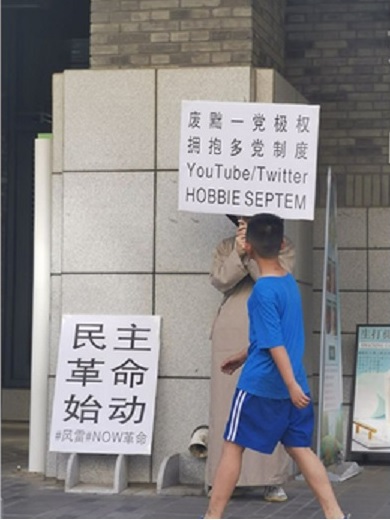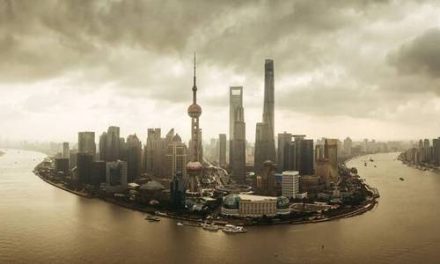By Huang Yicheng
Editor’s note: The author participated in the “white paper” movement, and is a graduate student at the University of Hamburg. Here he argues that in recent months, as more individual Chinese are willing to sacrifice themselves in public, by protesting against the CCP even though they know they will be cast into the maw of the Chinese state-security machine, a turning point has been reached in the freeing of the Chinese people.
In June, 2023 the city of Beijing in June 2023 is depressed, tense. “Dynamic clearing” or zero-COVID has become a history that cannot be mentioned. Expressions of public dissent are still being silenced one by one. The whereabouts of Mr. Peng Zaizhou’s [the name of a person who draped a sign over a bridge in Beijing demanding that the CCP step down before he was led away, and from whom nothing has been heard since] are unknown. At the end of last year, some of the arrestees in the “white paper movement” were released on bail, others sentenced to prison. And then, there were 2 lone-wolf protests in imitation of Peng Zaizhou. The first was by a woman who distributed leaflets with the text of the American Declaration of Independence near Linglong Tower in Beijing on June 3, and the second was a protest outside a cafeteria on the campus of Peking University June 22, demanding the “abolition of one-party dictatorship.” In current Chinese Internet language, this kind of behavior is called “tower rushing.” This word comes from the online game “League of Legends,” and refers to the dangerous taboo of ordinary people challenging the game’s authoritarian, violent machine with their fragile bodies.

I still remember how I felt when I saw Peng Zaizhou’s demonstration on Sitong Bridge in Beijing on October 13 of last year. At that time, I was sitting in a McDonald’s in Shanghai, and I clicked on Twitter to see the video on the Twitter feed of “Teacher Li is not your teacher” [a Chinese-language Twitter account whose owner, known as Teacher Li, is living overseas and publishes videos, announcements and text exchanges sent to him from inside China]. I felt numb, and my brain was spinning. On the one hand, I felt that my whole body was overwhelmed by fear, as it was hard to imagine what kind of torture is to be faced by those who openly challenge Xi Jinping’s dictatorship on the streets of Beijing. The extreme pain of that kind of impending bloody torture seemed to be imposed on Peng’s own body. On the other hand, I also felt the thrill of leaving the rails when challenging taboos. For many Chinese, Peng Zaizhou’s demonstration was a kind of enlightenment. My college classmate and good friend, Mr. Hayakawa Taiki, who is currently a lecturer in Sinology at Kobe University in Japan, once compared Peng Zaizhou to “seeing the incarnation of the Bodhisattva in one’s own lifetime” in the “Lotus Sutra.” Filled with sesame oil, he ignited himself with supernatural power and burned for 1,200 years, illuminating the previously dark universe. This time, many people initially felt worthless because Peng could not wake up China’s sleeping people as he blindly sacrificed himself. But more than a month later, from November 26th to 27th, Peng Zaizhou’s six “don’ts” and six “yes” slogans, as well as his appeal for the resignation of the Communist Party of China, became the rallying cry of the “white paper movement” at home and abroad.
Mr. Zhou Fengsuo, a “June 4th” democrat now living in exile in the United States, has suggested that the woman who demonstrated on June 3 in Beijing be called the “Linglong Tower Warrior.” We may also call Zhang Sheng, who demonstrated at Peking University on June 22, the “Peking University Warrior.” Although judging from the available information, this demonstrator may not have been a student of Peking University, he chose it as a symbolic location to protest, as in normal countries around the world universities have long been suitable places to express political demands. Therefore, referring to him this way may be true to his intentions. From the Sitong Bridge, to the Linglong Tower, and then to the cafeteria at Peking University, one after another extraordinary Chinese people are sacrificing themselves to build, one individual after another, milestones and landmarks in the Chinese people’s struggle for democracy. And so, just as Hong Kong people have the Star Ferry, Mong Kok, Yuen Long, Prince Edward, Connaught Road Central, Dundas Street, Lung Wo Road, we also have our protest movement landmarks — the Liangma River, Stone Bridge, Linglong Tower, the Peking University Cafeteria, the Tsinghua Bauhinia Cafeteria, Urumqi Middle Road, Wangping Street, Hanzheng Street, Dali Renmin Street…This list will continue to grow indefinitely, until the day when our struggle is successful, and permanent sculptures and monuments will then be erected on these landmarks. These places will become pillars of shame for the dictatorship everyone despised, and commemorate the glorious days of the people who bravely fought for freedom.
When the present author was studying at Peking University, there were always many unusual people displaying their slogans outside the university’s east gate. At that time, university security guards paid them no mind. Some of them claimed that they had mastered “Chinese and Western Malaysian philosophy,” and to have written great philosophical works. Some said that their attainments in physics surpassed Einstein’s. They printed out their books and give them to professors in the philosophy or physics departments, and most of the time no one paid much attention. The school also allowed them to move around the campus, and didn’t care about their raising their placards. Looking back, although China was not a democratic country at that time, the degree of openness was far greater than it is now. Although there were many problems at Peking University then, the relatively enlightened and free atmosphere is perhaps unimaginable to current students. Back then, in the university’s Cafeteria One, there was a strange man named “Huang Huogen”. All year round, he wore a strange red garment with the words “Founder of the Three Represents.” His image remains in the memories of many Peking University students. Later, when I went to Hong Kong, I saw graffiti commemorating the “Emperor of Kowloon,” Zeng Zaocai [a 20th-century graffiti artist in Hong Kong, highly influential in certain cultural circles there] at the Star Ferry in Tsim Sha Tsui. It was placed under a cover by Hong Kong people to protect it, and so I often connected the two people. According to the current fashion, they can be regarded as “performance artists.” Now, given that the “Three Represents” is part of the national ideology, it is presumptuous to claim to be the “Founder of the Three Represents.” But at that time, everyone tolerated Huang Huogen’s presence, which seems incredible now. Looking back, I can’t help detesting how much China’s modest civil society has regressed since the dictatorial traitor Xi Jinping came to power.
How did Peking University degenerate into what it is today? I think one of the most important turning points was the large-scale raid on the “Peking University Marxist Studies Association” in 2018. [The group had at that time published information on the poor working conditions of some university employees.] At least seven of my classmates were arrested at that time, and many were subjected to horrific torture. Students from impoverished areas were expelled from their homes. After the start of the next semester, Professor Yang Lihua from the Department of Philosophy took a position as the head of a new, replacement “Pseudo Marxist Studies Association.” And since then, the atmosphere on campus has become more and more depressing. After that, I also made up my mind never to go back to visit my alma mater.
And Peking University may be regarded as a barometer of the overall environment in Chinese society. The fact is that in a truly open environment, no one would care if someone tried to engage in serious political expression by raising a sign. In the West, countless people take to the streets to raise placards every day. No one takes them seriously, and most of the time they don’t change anything. Before 2018, this kind of political appeal, expressed in a public space, would not attract too much attention from Chinese society. But now that Xi Jinping has used severe repression to force civil society into a situation from which there is no retreat, any expression of such political appeals has become extremely irritating to the dictator and capable of pricking his hypersensitive nerves. And it must be said that the dictator has brought this upon himself.
Without question, neither [former Chinese presidents during the boom years] Jiang Zemin nor Hu Jintao had any intention of implementing a democratic system. But there are still fundamental differences between them and the dictatorial traitor Xi Jinping. In their youth, the first two grew up in the relatively open era of the Republic of China, and they also had a basic familiarity with Western culture. But Xi Jinping spent his youth during the Cultural Revolution, which caused serious damage to his spirit. He has very serious psychological problems. When encountering problems, he always wants to be in complete control. Yet the more he tries to control, the more dangerous and glaring the remaining bits and pieces of uncertainty are to him, which makes his desire for control even more overwhelming. He eventually becomes a “chief accelerator” who only knows how to step on the gas pedal, leading Chinese society to a point of no return, into the abyss.
The “Peking University Warrior Zhang Sheng” wrote on his sign the slogan “Abolish one-party centralization, embrace a multi-party system, and start the democratic revolution,” and also gave the addresses of his YouTube and Twitter pages, which linked to three Google Docs articles. The first, “On Freedom,” is 78 pages long and criticizes the literary and artistic censorship system implemented by the CCP regime. This reminds me of the sign “We Demand Artistic Freedom” that people hung on street lamps on Urumqi Middle Road in Shanghai on November 27 last year. The second, entitled “On Democracy,” is 36 pages long, and records the Chinese who died in the “June 4th Massacre, the Muxidi Case” [referring to the area of Beijing where the most people were killed] in 1989, and especially enthusiastically praised the social movement against “opposing the revision of the extradition bill” in Hong Kong in 2019, which reflected the great spirit shown by that city’s people. The third, “On Design,” is relatively short, only 11 pages long, and it is the author’s design for the route to China’s democratization. The inscription at the end shows that this article was written during the Hong Kong protest movement in 2019 and revised in 2020.
It can be seen that the struggle of “Peking University Warrior Zhang Sheng” was a self-sacrifice decided only after long deliberation. By the time the present author finished writing, “Peking University Warrior Zhang Sheng” had been arrested for nearly 24 hours. It is conceivable that the Beijing secret agents used any kind of torture we could imagine to force Zhang Sheng to hand over his Google password and delete the article. But he thought that his original reason to sacrifice himself was to let the whole world read his article, however much the secret police would torture him, and he would rather die than hand it over. When the present author thinks of the martyr who was trapped in the den of Xi’s Communist Party and ravaged by the servants of the devil while writing this article, he can’t help trembling, and feels a tremendous sense of responsibility. I wanted to record Zhang Sheng’s fearless sacrifice and enable people who care about China all over the world to pay attention to his writing. His writing is a message sent to us at an unimaginable cost, and we must absorb it.
“Zhang Sheng” is a generic Hong Kong name for addressing men, and non-Cantonese living in the mainland may rarely use this title. In the YouTube account of “Peking University Warrior Zhang Sheng,” there is a video showing him riding in a small boat on the bank of Yangliu Yiyi’s river, full of the graceful temperament of Chinese classical aesthetics. He sings the famous Hong Kong social-movement song “Broad Sea and Sky”, and his Cantonese pronunciation is not very pure. He has also tweeted, “Hong Kong people have always been very affectionate, Hong Kong, such a beautiful place. Solidarity with Hong Kong. I am willing to die for Hong Kong.” His love for Hong Kong made tears well up in my eyes right then and there. I wonder, if friends in Hong Kong see such language, will it bring a glimmer of hope to those who are living humiliated under the iron heels of the violent conqueror? For many democrats in mainland China, we live in a completely alien society, and we can only entrust all the loneliness in our hearts to Hong Kong, our secret confidant. We regard Hong Kong as our spiritual hometown. Even though we have not lived in Hong Kong for a long time, the excitement of spiritual connection amid the the vast darkness makes us spiritual Hong Kongers When I was in exile in Germany and participated in the June 4 rally in Berlin for the first time, when democrats had a dinner after the meeting, we were surprised to find that, except for a friend who had been in prison at that time, everyone else had participated in the protest movement in Hong Kong. A Hong Kong friend also told me that he didn’t know until he went abroad that there were so many mainlanders who participated in the Hong Kong protest movement, so many the number was unimaginable!
In March this year, the present author passed through Hong Kong to bid farewell to the city. At that time, I felt that the city was terribly depressed, and many people were exhausted. During the resistance movement in 2019, the city-state’s long-term accumulation of vitality in the development of civil society burst out, but then it was brutally suppressed, and it is now being suffocated. But at this moment, underground in mainland China society is surging. Our civil society has been wiped out by Xi Jinping, but in such a bad situation, any spark dazzles us, and there is a feeling that their bravery and self-sacrifice make us tingle, and so we need have no fear and can continue to strive to reach China’s turning point. The decentralized protest model of “no big platform” in Hong Kong has been further developed in the “white paper movement” on the mainland. Now the social movement in mainland China is in the ascendancy, and the model created by the spirit of Hong Kong’s people will bear fruit among young people on the mainland.
Whenever the present author feels disheartened, Teacher Li often calls to cheer me up. He says that in the second half of this year, China will definitely have a larger-scale social movement than the “white paper movement,” and we outside the country need to form a corresponding movement to be ready, to link up with the coming social advancement. We exiles can all be ready to return home. His words are so confident; he has absolutely no doubt. Today, the youth unemployment rate announced by the Chinese government is close to 20%. According to photos released by Teacher Li on April 14 from the internal meeting of Shanghai Ocean University, the employment rate of undergraduates in Shanghai is 24.1%. A large number of young college graduates cannot find jobs anywhere in society. And on the other hand, the failure of Xi Jinping’s three-year zero-Covid policy has made people from all walks of life and ages in Chinese society doubt his ability to rule. The stagnation in China’s economic growth has eliminated the original legitimacy of the CCP to hold power. The public-opinion incidents that are constantly emerging in society become known online through clever tactics, one by one, though comments about them are prohibited. The Sitongqiao [Beijing bridge] demonstration and the white-paper movement have led to the enlightenment of the Chinese people and the resultant social movements. Today’s Chinese society is like a hot room full of dry kindling, just waiting for the next spark to emerge.
We are overseas, and the situation is quite urgent now. We need to create relevant methods to prepare for further domestic social activism, in which Teacher Li in Italy is a central figure. History has selected him as one who has the sincere trust of activists. We must give him more support. In addition, based on the history of previous movements, we need to provide summaries of what has been experienced in the past to help compatriots in China face the dangers that are coming. For those who have already sacrificed themselves, we cannot allow their blood to be shed in vain, and we must widely publicize their righteous deeds to the Western media and the public. Most importantly, we need to be confident. As long as we maintain our confidence, and our expectations, and work with our compatriots in China, what we expect will definitely happen. We are closer than ever to this final moment.
As for our domestic brothers and sisters, I hope you will protect yourselves more and I urge you to not charge the tower blindly. You can save the photos and videos of those who previously charged the tower in a safe place in your mobile phone, share them with your family and friends at offline gatherings, and introduce people to the deeds of Peng Zaizhou, the White Paper Movement, the Linglong Tower Warriors, and Zhang Sheng of Peking University. Fear crumbles bit by bit. When all Chinese people are no longer afraid, it is Xi Jinping and his raptors and wolves that will fear.
The Warrior of the Beijing Linglong Tower wrote on her leaflets: “China must embrace the world and become a truly free and democratic country, a country that everyone wants to come to, not a place that everyone wants to escape from. In this world, there are only are two kinds of people: those with the universal values system, and those without it. If you think the same as I do, please think about what you can do for freedom and democracy in China from now on. Act now! Do what you can! We already have no time!”
The dictator Xi Jinping is dragging China into a bottomless abyss. Once the war to take back Taiwan begins, we will be like the Russians, and the entire country, the entire Chinese people will be spurned by the whole world. Now, two possibilities — a large-scale social movement in mainland China and Xi Jinping’s launching of war in the Taiwan Strait — are racing against each other. Whether at home or abroad, everyone has the responsibility to choose our future through our individual actions, no matter how small. We are running out of time and we must take responsibility for these actions.























